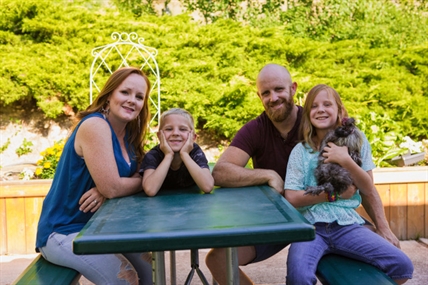Elevate your local knowledge
Sign up for the iNFOnews newsletter today!
Sign up for the iNFOnews newsletter today!
Selecting your primary region ensures you get the stories that matter to you first.

For Amanda DeMarni and her family, keeping her animals safe during the current extreme heat is a round-the-clock job.
The family of four runs a small farm on five acres of land in Kamloops. The heat has put a strain on their livestock and gardens, requiring early mornings and late nights feeding and watering.
"It's brutal," DeMarni said Tuesday, June 29. "We almost lost a pig last week when its pool ran dry. Pigs don't sweat so they overheat super easily. We now have four kiddie pools, a mud hole and sprinklers running. We soak them down and have cool water filling their pit at all times."
The farm is made up of garden areas, flower beds and patios. There are over 30 trees including Saskatoon bushes, fruit trees and herbs. All of which require water.

DeMarni is concerned about the 50 chickens she has and allows them to free-range during the day in order for them to find shady, comfortable places to sit.
"We are supplying the chickens with extra water," DeMarni explained. "We have been giving them electrolytes, ensuring they have shade and constantly filling waterers with cool water. We are feeding as early and late as possible."
DeMarni says her family is getting tired. They have been out feeding and watering by 5 a.m. since the heat wave arrived.
"It is hard for sure," DeMarni said. "Our friends have dairy goats and it's even harder for them. No one wants to eat when it is this hot, so their milk production is way down. Our gardens are OK. We have irrigation and I have been hand watering. I doubt our lettuce, broccoli, cauliflower or cabbage will survive this though."
Amanda DeMarni and her husband Rino started their farm in 2016 to grow their own food and live a sustainable life. Marni enjoys gardening, homesteading and regenerative agriculture, while Rino owns and operates a local landscaping firm.
They have plans to install solar panels, a grape arbour and a greenhouse in the future.
"I love the idea of having fresh food that is grown without pesticides, herbicides, hormones or antibiotics," DeMarni said. "We want meat from an animal that has had a happy life, not one of torture. We have many big ideas for our future that will expand our sustainable life as a family."
We welcome your comments and opinions on our stories but play nice. We won't censor or delete comments unless they contain off-topic statements or links, unnecessary vulgarity, false facts, spam or obviously fake profiles. If you have any concerns about what you see in comments, email the editor.
News from © iNFOnews.ca, . All rights reserved.
This material may not be published, broadcast, rewritten or redistributed.

This site is protected by reCAPTCHA and the Google Privacy Policy and Terms of Service apply.
Want to share your thoughts, add context, or connect with others in your community?
You must be logged in to post a comment.